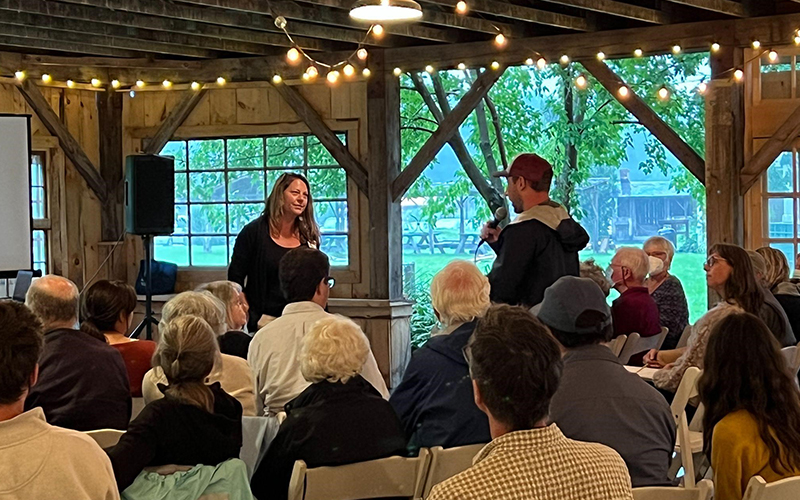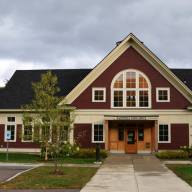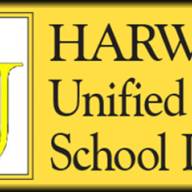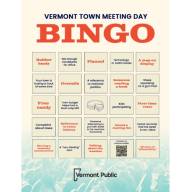On Tuesday, July 5, Friends of the Mad River and the Mad River Valley Planning District hosted over 100 community members at the Lareau Farm in Waitsfield to explore the current and future climate change impacts in the Mad River Valley. The evening was headlined by Dr. Gillian Galford and Dr. Stephen Posner, lead authors on the recent Vermont Climate Assessment. The event was moderated by Heather Furman, state director of the Nature Conservancy in Vermont.
A light rain fell as the presentation got underway, and Furman invited attendees to find hope in spite of the challenges climate change poses. Drawing from the words of the Nature Conservancy’s chief scientist, Katharine Hayhoe, Furman shared, “The number one thing you can do to address climate change is talk about it,” setting the stage for Friends of the Mad River’s first Community Climate Chat.
Dr. Galford is a professor in the Rubenstein School of Environment and Natural Resources and a Fellow of the Gund Institute for Environment at UVM. She is an expert in ecology and climate change and is the founding director of the Vermont Climate Assessment. Her presentation began with an appreciation of the Mad River Valley, asking the audience, “When was the last time it struck you what a wonderful place you live in?” Galford made connections between cherished aspects of Valley life, like skiing in winter and river swimming in summer, and how a changing climate will impact these features.
Using data from the Northfield weather station, Galford illustrated how climate change is already affecting the Mad River Valley. Consistent with regional trends for the Northeast, the data shows warmer winters. “The overnight temperature is rising and there are fewer days each winter with temperatures below zero degrees Fahrenheit,” said Galford, adding, “Precipitation has changed [in the MRV] over the last 60 years from roughly 34 to 47 inches per year.” By contrast, she also said that, “Portland [Oregon], which you might think of as a very wet place, gets 44 inches of rain per year.”
Galford also emphasized that rain is falling in greater amounts during heavy storms. Days with heavy precipitation, more than 1 inch of rainfall in 24 hours, have increased in all seasons over the last 60 years. With the increased precipitation, the Mad River has seen increased streamflow. This means that more water is moving through the river than in the past, including an increase in the number of high flow and flood events.
As Galford handed the microphone off to Posner, the rain became a downpour and the sound of water hitting the pavilion's tin roof caused a halting start to the second presentation. “While the noise of the heavy rainfall was not ideal during a presentation,” remarked Friends of the Mad River director Corrie Miller, “it showcases the topic at hand.”
Posner is director of policy and partnerships with the Gund Institute for Environment at UVM. An expert in environmental science and policy, Posner has worked with researchers to guide decision making from town governments to the White House. His presentation further underscored climate change impacts and noted, “Winter temperatures are warming two and a half times faster than temperatures generally.”
During the moderated session, many of the audience’s comments focused on the pronounced impacts to winter and on the question of what individuals can do. A local eighth-grade Harwood student asked, “How can you get people to care [about climate change]? People often care only when it is convenient for them but that is not convenient for my generation.” Galford encouraged the student to continue to get involved.
The next Community Climate Chat will feature Jane Lazorchak, director of the Global Warming Solutions Act, and will focus on the state of Vermont’s Climate Action Plan. The event will be held at the Pavilion at Lareau Farm and will run from 5:30 to 7:30 p.m. on Tuesday, August 9. Tickets are free but registration is required; visit friendsofthemadriver.org/climate. Tickets include American flatbread and veggie appetizers and there will be an open cash bar. Donations are appreciated to help make this and future events freely accessible to all.












